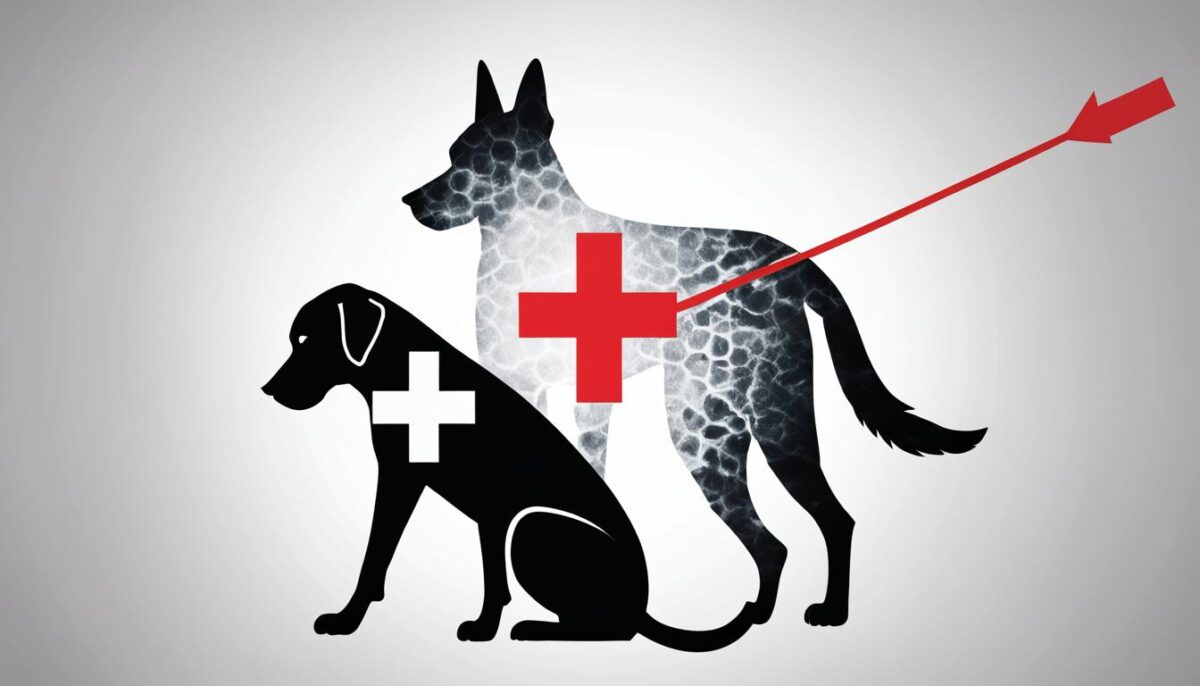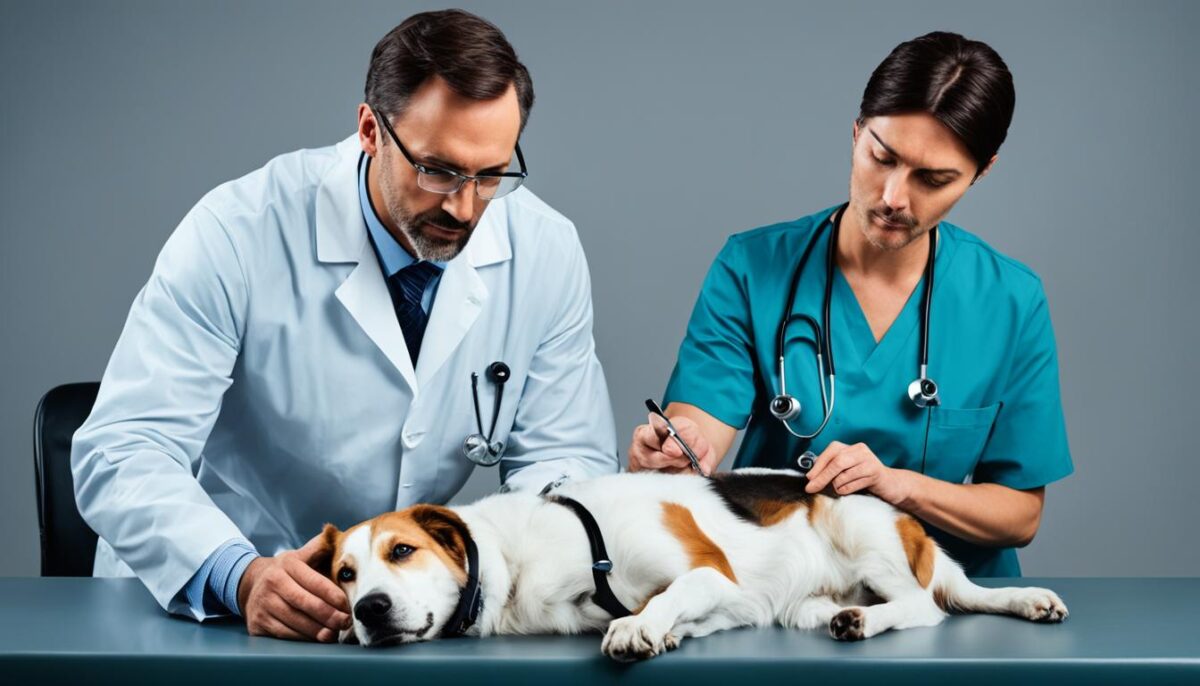Have you ever wondered if your furry friend can get sick with the same illnesses you do? When it comes to hepatitis, a common human liver infection, you might be curious to know, can dogs get hepatitis from their owners? Well, the answer is reassuring! Dogs cannot catch hepatitis from humans because the virus that makes dogs sick is different from the one that affects people.
Even though dogs have their own kind of hepatitis, called canine viral hepatitis, it’s become a rare disease. This is thanks to an effective hepatitis vaccine given to puppies. When our pets get their shots, it keeps this illness away, making hepatitis in pets very uncommon these days. That’s great news for you and your four-legged pal!
As a pet owner, your job is to make sure your dog stays healthy and happy. So, understanding how these diseases work keeps your mind at ease and your dog’s tail wagging.
Key Takeaways
- Dogs cannot get hepatitis from humans.
- Canine viral hepatitis is different from the human virus.
- Vaccines have made dog hepatitis rare.
- Keeping up with pet vaccinations is important.
- Your dog’s health is safe when it comes to human hepatitis.
Understanding Hepatitis in Dogs
Hepatitis in dogs can sound scary, but it’s important for you as a pet owner to know about it. This sickness is called infectious canine hepatitis, and it’s caused by a virus named canine adenovirus type 1. This virus can make many parts of a dog’s body feel bad, including the lungs, liver, and kidneys.
Dogs can catch this virus from other dogs by touching their saliva, pee, or poop. But don’t worry, this is not the same hepatitis that people can get, so your sickness can’t jump to your furry friend. Because of really good shots, called vaccinations, getting canine viral hepatitis is quite rare now in the U.S.
If you’ve heard about infectious canine hepatitis, these are the key points:
- Dogs get it from a virus, not from people.
- It harms important parts like the liver.
- It spreads through infected dog’s fluids.
- Vaccines are super helpful in stopping it.
So, make sure your dog gets their shots, and then you can both be happy and worry a little less about hepatitis in dogs.
Can Dogs Get Hepatitis from Humans?
As a pet owner, you care a lot about your furry friend’s health. It’s important to know that dogs cannot get hepatitis from humans. You might have heard of hepatitis in people, but the hepatitis viruses that affect humans do not spread to dogs. There’s a special kind of hepatitis that dogs can get, but it’s very different from the kind humans get.
People and dogs have their own types of hepatitis. This means that you don’t have to worry about your dog catching the disease from you or any other person. For pet safety, it’s good to understand this because it helps you to take care of your dog in the right way.
Even though dogs can’t get human hepatitis, they can have their own health issues. This is why pet safety is so important. Dogs playing with other dogs, or dogs who haven’t had their shots could get sick. But there’s no risk of hepatitis cross-species transmission between you and your dog. So, you can hug and play with your dog without any worry about this disease.
Here’s a simple comparison to show the differences:
| Disease | Humans | Dogs |
|---|---|---|
| Hepatitis Type | Hepatitis B and C | Canine Hepatitis |
| How it Spreads | Through body fluids, not air | Direct contact with infected dog’s saliva or poop |
| Risks to Other Species | None to dogs | None to humans |
| Vaccination | Available for humans | Available for dogs, very effective |
Caring for your dog’s health should always be top of mind. Your dog counts on you for their well-being. That’s why it’s a great idea to make sure they get their vaccinations and regular checkups. This keeps them safe from many doggy health risks.
Always remember, for the best pet safety, if you have any worries about your dog’s health, take them to see the vet. They’re the experts who can help make sure your buddy stays happy and healthy!
Distinguishing Canine Hepatitis and Human Hepatitis
Did you know that our furry friends can get sick with diseases that are a bit like our own but not the same? It’s essential to understand the differences between canine hepatitis—a sickness dogs can get—and the types humans can get. This way, you keep your pet pals healthy and happy!
How Infectious Canine Hepatitis Spreads Among Dogs
Imagine if you got a cold every time you played with someone who had a runny nose. For dogs, something similar can happen with a disease called canine hepatitis. Dogs can catch this from the body fluids, like saliva or pee, of sick dogs. If a dog gets this virus, it might take about a week before it feels really sick. Even if a dog gets better, it can still pass the virus to other dogs for up to a full year!
The Impact of Vaccination on Canine Hepatitis
You know how when you get a tiny ouchie from a shot, it helps you to not get really sick later? That’s what hepatitis vaccination does for dogs. Puppy vaccines are super important to keep our puppies from getting diseases like canine hepatitis. When puppies are little, they get a special shot that protects them from canine hepatitis almost their whole life! This vaccine is so strong that they don’t need a bunch of boosters, which means fewer ouchies for them.
Thanks to these smart doctors making vaccines, there are way fewer cases of sick doggies with canine hepatitis. So, don’t forget to take your dogs for their shots, because it’s one of the best things you can do for canine health!
Recognizing the Symptoms of Canine Hepatitis
If you have a furry buddy at home, knowing about hepatitis symptoms is important for your pet care routine. Canine hepatitis is a sneaky illness that can affect your dog without you knowing it right away. To keep your pet safe from canine illnesses, it’s good to learn about the signs of this disease, how it’s found (hepatitis diagnosis), and what to do in dog health emergencies.
One of the first things you might notice is if your dog seems sad or tired. They might not want to eat and they could have a little fever. Sometimes, their eyes might look a bit blue and they might have swelling. These could all be early signs that something is not right.
Early Signs of Hepatitis in Dogs
When your four-legged pal isn’t acting like their usual self, it’s a signal to pay attention. If you see your dog looking very sleepy, turning away from their food, or feeling hot like they have a fever, these could be early hepatitis symptoms. If their eyes are a weird blue color, it’s time to take a closer look because these are hints that your dog might be unwell.
When to Consult a Vet: Identifying Severe Cases
More serious signs that your dog is really sick can be scary. If your dog’s skin or eyes start to look yellow, if they throw up, or if you see blood, it’s super important to get them to the vet quickly. Acting tired, being grumpy, or changes in how much they chow down can also be clues that they need veterinary care fast. Vets can check how your dog is doing by looking them over and taking some blood to test how their liver is working.
Remember, you know your dog best. If they’re not their happy, tail-wagging self, it’s better to check with your vet. It might be nothing, but it could also be hepatitis diagnosis time. Keeping a close eye on your dog’s behavior and how they feel is a big part of loving and caring for your pet.
Preventing Hepatitis in Dogs
Keeping your furry friend safe from illness is super important. One big way to help keep them healthy is by making sure they get their pet vaccinations. Just like when you get a shot to stop you from getting sick, dogs need shots too. This is a part of preventive healthcare which helps them stay away from nasty diseases like hepatitis.
It’s especially important for little puppies to get their shots because it helps them grow up strong and healthy. But, older dogs need them too if they haven’t gotten their vaccinations yet. Your vet can give your dog a hepatitis vaccine. This shot is like a shield to protect them against the hepatitis bug and other sicknesses. This is all part of keeping your pet feeling great, which is what pet wellness is all about.
Let’s check out why vaccines are so awesome for your dogs:
- Vaccines keep your pets from getting sick with diseases that can hurt them a lot.
- Getting a shot might pinch a little, but it’s way better than getting really sick.
- If your pup ever goes to play with other dogs, having their shots means they can have fun without worrying about catching something bad.
Here’s a simple breakdown of when dogs usually get their shots:
| Age of the Dog | Type of Vaccine | Why It’s Important |
|---|---|---|
| 6-8 weeks old | Hepatitis (part of combo vaccine) | First step in protecting your puppy |
| 10-12 weeks old | Second round (booster) | Makes sure the shield stays strong |
| 16-18 weeks old | Final round (booster) | Full shield is now up! |
Remember, keeping up with your dog’s shots is part of good care. When you go to the vet, you can ask them about your pet’s shots and keep track of when they need them. Then you can feel happy knowing you’re doing a great job at keeping your best friend safe and happy!
Conclusion
There’s a big myth that’s been barking up the wrong tree: people think dogs can get sick from humans with hepatitis. But that’s just not true. The sneaky virus that makes people sick with hepatitis cannot jump to dogs. They are different, like how peanut butter and jelly are different from a sandwich. Your dog gets his own type of hepatitis, which doesn’t come from you. Understanding this keeps your four-legged pal safe!
Separating Myths from Facts: The Final Take on Canine and Human Hepatitis
You care about your dog, and you want to know the truth about their health. Now you know that human hepatitis and dog hepatitis are not the same. Keeping up with the true stories about dog health helps you become a super dog owner. Remember, knowledge about understanding hepatitis means you can stop those health myths in their tracks and keep your buddy wagging their tail.
Protecting Your Furry Companion: The Importance of Vaccination
Picking the right armor is important, and for your dog, that armor is their vaccines. Make sure they get their shots to fight off any hepatitis viruses meant for them. Doing this simple thing, you are giving them a shield, and that’s showing big love for your furry friend. Put on your superhero cape, because with the right vaccinations, you are saving the day for your pup’s health!
FAQ
Can dogs contract hepatitis from humans?
No, dogs cannot contract hepatitis from humans as the viruses that cause hepatitis in humans are specifically adapted to the human immune system and do not pose a threat to dogs.
What is hepatitis in dogs, and how is it caused?
Hepatitis in dogs is an infectious disease caused by the canine adenovirus type 1 (CAV-1), which affects the liver, kidneys, and other organs. It is not the same as the hepatitis viruses found in humans.
How can I prevent my dog from getting hepatitis?
The best prevention against canine hepatitis is vaccination. Ensure your dog receives the core combination vaccines, which include protection against the contagious canine viral hepatitis.
What are the signs of infectious canine hepatitis in dogs?
Early signs of infectious canine hepatitis can include your dog appearing depressed and lethargic, having a loss of appetite, and a low fever. More severe symptoms can involve jaundice, vomiting, or bleeding.
How is infectious canine hepatitis spread among dogs?
Infectious canine hepatitis spreads through contact with infected body fluids from other dogs, such as saliva, urine, or feces. The virus can be contagious even after recovery, up to a year.
Are puppies at risk of contracting hepatitis, and when should they be vaccinated?
Puppies are at risk but they can be protected against hepatitis with vaccinations usually given early in their lives, which can provide lifelong protection.
How can I tell if my dog’s hepatitis case is severe?
More severe cases of hepatitis can present as jaundice, excessive vomiting, or unusual bleeding. If your dog exhibits any severe symptoms, it is imperative to seek veterinary care immediately.
Can human hepatitis vaccines help prevent hepatitis in dogs?
No, human hepatitis vaccines cannot prevent hepatitis in dogs because the viruses that cause hepatitis in each species are different. Dogs require canine-specific hepatitis vaccinations.


